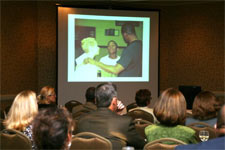Centennial conference cites partnerships as essential tool for closing achievement gap
No matter how hard we try to improve teaching and learning in our public schools, or how faithfully we execute the intent of the federal No Child Left Behind Act, the achievement gap between students of different income levels and social or ethnic backgrounds can be substantially narrowed “only when school improvement is combined with social and economic reform.”
Noted education policy expert and author Richard Rothstein
Noted education policy expert and author Richard Rothstein drove home that point in his keynote address at the UF College of Education’s recent national conference, “Closing the Achievement Gap Through Partnerships,” held in November in St. Petersburg.
Rothstein, a research associate at the Economic Policy Institute and former national education columnist for The New York Times, said good teaching alone is not sufficient to close the achievement gap. His comments echoed opinions cited in some of his publications on education policy in America, including his recent book, “Class and Schools: Using Social, Economic and Educational Reform to Close the Black-White Achievement Gap.”
“If we properly identify the actual social class characteristics that produce differences in average achievement, we should be able to design policies that narrow the achievement gap,” Rothstein says. “Certainly, improvement of instructional practices is among these, but a focus on school reform alone is bound to be frustrating and ultimately unsuccessful.”
Rothstein was one of several prominent speakers at the conference, held as the culminating event of the College of Education’s yearlong centennial celebration. Several speakers cited the connection between school improvement and social reform, and the advantages of forming community partnerships to help narrow the social and economic influences that produce differences in average achievement between children.

Conference attendees view a slide from a presentation given by Marilyn Cochran-Smith of Boston College.
Other speakers included:
- Marilyn Cochran-Smith of Boston College (topic: Teaching for social justice in an era of accountability)
- Heather Weiss of the Harvard Family Research Project (Complementary Learning: Can we build effective family, school and community connections so that truly no child is left behind?)
- Etta Hollins of the University of Southern California (Transforming the culture of practice in low performing schools)
School superintendents from three Florida districts—Ronald Blocker (Orange County), Mary Ellen Elia (Hillsborough County) and James McCalister Sr.(Bay County) – also participated in a panel discussion on teaching for social justice in an era of accountability.
Many of the college’s community partnerships and public scholarship activities were featured in breakout sessions and poster sessions led by UF education faculty and doctoral students. Featured college programs included the UF Alliance, the Lastinger Center for Learning, the schoolwide writing program at Newberry Elementary School, studies on male underachievement in education, the Libros De Familia home-literacy initiative with migrant farm working families, P.K. Yonge School’s student-led parent conferences, and college-sponsored teacher inquiry programs and teacher learning communities.
More than 200 educators, counselors and public policy leaders, from across the state and nation, attended the conference, which was coordinated by Eileen Oliver, an affiliate professor in the School of Teaching and Learning and associate dean in UF’s division of continuing education. A collegewide committee of faculty and staff assisted in planning and implementation.
Professor Buffy Bondy of the School of Teaching and Learning said the highlight for her was “seeing so many College of Education students and graduates presenting their work at the conference.”
“We had ProTeach students, practicing teachers who have graduated from our program, and doctoral students presenting along with faculty members,” Bondy said. “I (also) felt proud of our college for the work we do to address pressing problems in teaching and learning in high-poverty schools.”
UF Education Dean Catherine Emihovich closed the conference by issuing a “call to arms” for all educators to take direct action in bringing about substantive changes in children’s education and well-being across the state and throughout the nation.
# # #
Writer
Larry Lansford, llansford@coe.ufl.edu, 352-392-0726, ext. 266




